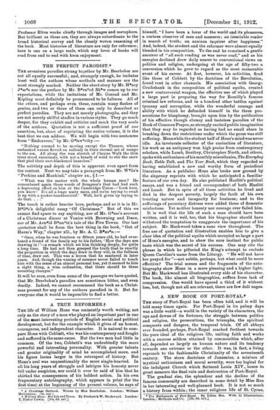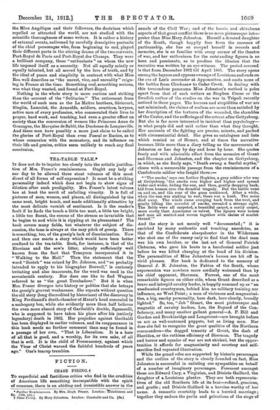A NEW BOOK ON PORT-ROYAL.*
THE story of Port-Royal has been often told, and it will be told many times again. For Port-Royal in its palmy days was a little world—a world in the variety of its characters, the ups and downs of its fortunes, the struggle between' politics and religion, the persecutions, the triumphs, the spiritual conquests and dangers, the temporal trials. Of all abbeys ever founded, perhaps, Port-Royal reached furthest towards the pure ideal of the religious life, uniting faith and works with a success seldom attained by communities which, after all, depended so largely on human nature and its tendency towards one extreme or the other. It was, in fact, a living reproach to the fashionable Christianity of the seventeenth century. The stern doctrines of Jansenius, a mixture of mystical enthusiasm and moral severity, were too logical for the indulgent Church which flattered Louis XIV., hence in great measure the final ruin and destruction of Port-Royal.
The gradual rise, the splendour and the decline of the famous community are described in some detail by Miss Rea, in her interesting and well-planned book. It is not so much a history from within ; the inner religious life of St. Cyran,
• The Enthusiasts of Port-Royal. By Lilian Rea. With 12 Illustrations. London : Methuen and Co. [10s. 6d. net.]
the Mare Angelique and their followers, the doctrines which repelled or attracted the world, are not studied with the scientific thoroughness of some writers. It is rather a history of external events, enlivened by carefully descriptive portraits of the chief personages who, from beginning to end, played their different parts in the stirring drama of the two convents, Port-Royal de Paris and Port-Royal des Champs. They were a brilliant company, these "enthusiasts " on whom the new life imposed itself as a necessity. Not all equally saintly or equally talented, but all moved by the love of truth, and by the ideal of peace and simplicity in contrast with what Miss Rea well describes as "the unrest, vice, and unreality" reign- ing in France at the time. Something real, something serious, was what they wanted, and found at Port-Royal.
Nothing in the whole story is more curious and striking than the account of the " Solitaries." The retirement from the world of such men as the Le Maitre brothers, Sericourt, Singlin, Lancelot, the Arnaulds, soldiers, courtiers, lawyers, active men of every profession, who consecrated their lives to prayer, hard work, and teaching, had even a greater effect on society than the conversion of women like Princesse Anne de Gonzague, the Marquise de Sable, the Duchesse de Longneville. And these men have possibly a more just claim to be called the glories of Port-Royal than even Pascal or Racine, as to -whose connexion with the monastery, and its influence on their life and genius, critics seem unlikely to reach any final conclusion.











































 Previous page
Previous page